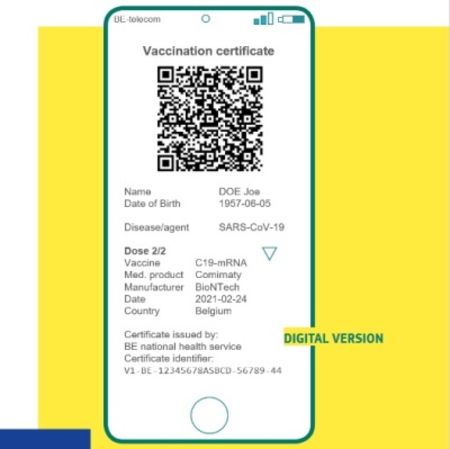The European Commission has officially proposed the creation of the EU's ‘COVID-19 passport’ and is planning to have introduced the ecosystem by summer.
You might also like: The European Commission aims to have vaccinated 70% of the adult population by summer 2021.Learn more
The ‘Digital Green Certificate’ (DGC) should be free, secure and available in both paper and digital formats employing QR codes and digital signatures. It should be issued in two languages, that is of the issuing state and English. The initiative is open to all EU member states as well as to Iceland, Liechtenstein, Norway and Switzerland.
It is stressed that the document must be non-discriminatory against those non-vaccinated and should not prevent them from travelling or visiting places. Therefore, it is suggested the certificate has three parts:
- Vaccination certificates with information about the vaccine product, date of inoculation and number of doses.
- Test certificates with information on type of test (NAAT/RT-PCR test or a rapid antigen test, not self-tests), date and place of test, and result.
- Recovery certificates with information on date of positive test result, date of issue and issuing organisation and validity date (currently 180 days from the date of issue).
The Commission pledged to create an interoperable
system (a gateway) to ensure all certificates can be verified across the participating
countries, and provide necessary support to the participants. The countries
should apply to DGC holders the same approach to waiving certain public health
restrictions (e.g. testing or quarantine) as to those with other proof of
vaccination. It is noted that only the vaccines authorised for use in the EU
are eligible, but individual countries may also add other vaccines to the list.
As of now, there are no specific recommendation on the period of DGC relevance. The member states should be able to determine that following their national rules.
The Commission aims to have launched the DGC system by summer pending official approval by the European Council and the European Parliament. This measure is temporary and would be lifted once the World Health Organization (WHO) declares the end of the pandemic.
In its statement, the Commission emphasises that only a minimum set of information would be included in the certificates and that being vaccinated would not be a pre-condition to travel.
More information about the DGC initiative is available in the Commission’s Q & A report.
In the meantime, the move is seen as controversial by many who argue that it may lead to discrimination and the division of society, especially due to the fact that availability of vaccines as well as knowledge about their efficiency is still limited. In its interim position on the matter, WHO recommends that “national authorities and conveyance operators should not introduce requirements of proof of COVID-19 vaccination for international travel as a condition for departure or entry”. This is supported by countries such as France and Belgium.
At the same time, Denmark and Sweden announced their plans to introduce digital COVID-19 certificates in early February, and Germany has recently contracted a consortium led by IBM to develop a national digital vaccine certificate. Tourism-dependent countries such as Spain, Greece and Portugal, also support the idea of digital proof of vaccination. In turn, Israel has taken this even further and now requires proof of vaccination not only for travel but also for a wide range of domestic activities, both leisure and professional.
Image credit: European
Commission



























